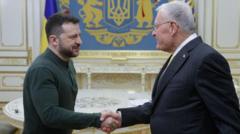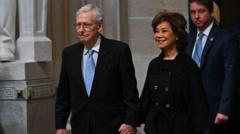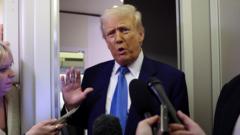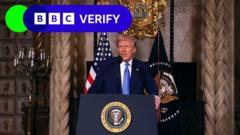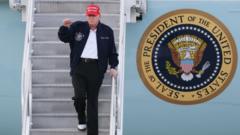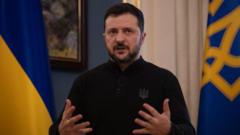The article examines the implications of key discussions on NATO, U.S. foreign policy, European defense spending, and the ongoing war in Ukraine.
**Shifts in Geopolitical Alliances: Insights from the Munich Security Conference**
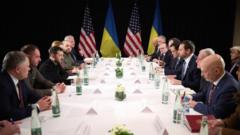
**Shifts in Geopolitical Alliances: Insights from the Munich Security Conference**
A breakdown of significant issues raised at the recent Munich Security Conference, highlighting the evolving dynamics of international relations.
In Munich, the international conversation surrounding security and defense took a pivotal turn as the Munich Security Conference unfolded, revealing significant shifts in geopolitical alliances. Central to the discussion was the relationship between the United States and Europe, particularly in light of ongoing conflict in Ukraine. Here are five critical takeaways from the conference.
1. **Potential Shift in NATO's Role**
Established in 1949 to counter Soviet influence, NATO's essence is now being questioned. The alliance, which now includes 32 member states, pledged mutual defense, but recent discussions suggest that reliance on the U.S. as a primary security guarantor may be waning. With calls from U.S. officials for European allies to substantially increase defense spending, experts warn this could signify the end of post-World War II security dynamics in Europe.
2. **US-Russia Dialogue Resumes**
Despite Ukraine's insistence on being involved in peace talks, U.S. and Russian officials are set to meet in Saudi Arabia next week to negotiate an end to the conflict. This dialogue marks a significant thawing from three years of bitter estrangement, posing questions about trust and the credibility of agreements without Ukrainian representation. Ukrainian President Volodymyr Zelensky remains apprehensive about any outcomes from talks in which his nation is excluded.
3. **Rising Defense Budgets in Europe**
Participants acknowledged the urgent need for Europe to significantly boost its defense budgets. The current NATO guideline of 2% GDP expenditure is likely to increase to 3%, especially as tensions with Russia rise. European nations have already surpassed U.S. financial assistance to Ukraine, emphasizing their commitment to sustained military support, yet the disparity in defense spending with Russia raises alarms over security readiness.
4. **Controversial Remarks by US Leadership**
U.S. Vice President JD Vance's speech at the conference met with mixed reactions, where many delegates found his criticism of European policies as counterproductive. Vance's assertion that European governments are retreating from core values stunned attendees, eliciting silence rather than the expected reassurance of U.S. support for Ukraine. This divisiveness reflects broader rifts in international policy responses.
5. **Emerging Disunity Among Allies**
As discussions continued on pressing geopolitical issues, the announcement by Donald Trump regarding tariffs on steel and aluminum imports indicates shifting trade sentiments and increasing discord between the U.S. and Europe. This divergence complicates the UK's balancing act as it seeks to maintain strong ties with both the U.S. and the EU, while struggling with the implications of fluctuating diplomatic messages from Washington.
The Munich Security Conference has thereby highlighted critical junctures in international relations, particularly regarding security alliances and the pivotal role of Europe in the sphere of defense and foreign policy. As global tensions persist and evolve, the coming weeks may reveal more about the durability and adaptability of existing alliances.
1. **Potential Shift in NATO's Role**
Established in 1949 to counter Soviet influence, NATO's essence is now being questioned. The alliance, which now includes 32 member states, pledged mutual defense, but recent discussions suggest that reliance on the U.S. as a primary security guarantor may be waning. With calls from U.S. officials for European allies to substantially increase defense spending, experts warn this could signify the end of post-World War II security dynamics in Europe.
2. **US-Russia Dialogue Resumes**
Despite Ukraine's insistence on being involved in peace talks, U.S. and Russian officials are set to meet in Saudi Arabia next week to negotiate an end to the conflict. This dialogue marks a significant thawing from three years of bitter estrangement, posing questions about trust and the credibility of agreements without Ukrainian representation. Ukrainian President Volodymyr Zelensky remains apprehensive about any outcomes from talks in which his nation is excluded.
3. **Rising Defense Budgets in Europe**
Participants acknowledged the urgent need for Europe to significantly boost its defense budgets. The current NATO guideline of 2% GDP expenditure is likely to increase to 3%, especially as tensions with Russia rise. European nations have already surpassed U.S. financial assistance to Ukraine, emphasizing their commitment to sustained military support, yet the disparity in defense spending with Russia raises alarms over security readiness.
4. **Controversial Remarks by US Leadership**
U.S. Vice President JD Vance's speech at the conference met with mixed reactions, where many delegates found his criticism of European policies as counterproductive. Vance's assertion that European governments are retreating from core values stunned attendees, eliciting silence rather than the expected reassurance of U.S. support for Ukraine. This divisiveness reflects broader rifts in international policy responses.
5. **Emerging Disunity Among Allies**
As discussions continued on pressing geopolitical issues, the announcement by Donald Trump regarding tariffs on steel and aluminum imports indicates shifting trade sentiments and increasing discord between the U.S. and Europe. This divergence complicates the UK's balancing act as it seeks to maintain strong ties with both the U.S. and the EU, while struggling with the implications of fluctuating diplomatic messages from Washington.
The Munich Security Conference has thereby highlighted critical junctures in international relations, particularly regarding security alliances and the pivotal role of Europe in the sphere of defense and foreign policy. As global tensions persist and evolve, the coming weeks may reveal more about the durability and adaptability of existing alliances.

